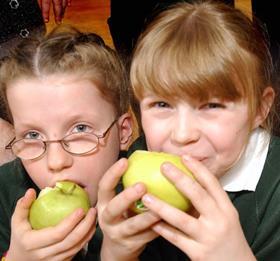
The European Union's School Fruit Scheme has proved a popular draw for most countries across the continent, with all but three of the 27-strong bloc signing up to take part in the drive to increase the consumption of fresh produce in schools.
Only Finland, Latvia and Sweden have opted out of the first year of the scheme, which sees the EU provide €90m in funding to each country to distribute fruit and vegetables, with that total subsequently matched by public and private funds in each country.
According to Reuters, the countries that have decided not to participate can join the agreement from the start of the scheme's second school year if they so wish.
Countries will be able to restrict the programme to include EU-grown fresh produce or imports depending on availability, seasonality and price.
'I'm delighted that so many member states have decided to make use of this excellent scheme,' said EU agriculture commissioner Mariann Fischer Boel in a statement. 'I believe it can make a major contribution to encouraging out young people to eat more of these healthy and tasty products.'
It is hoped that the School Fruit Scheme will help drive down obesity levels amongst children in the EU, which currently stands at over 5m, with a further 17m considered overweight.



